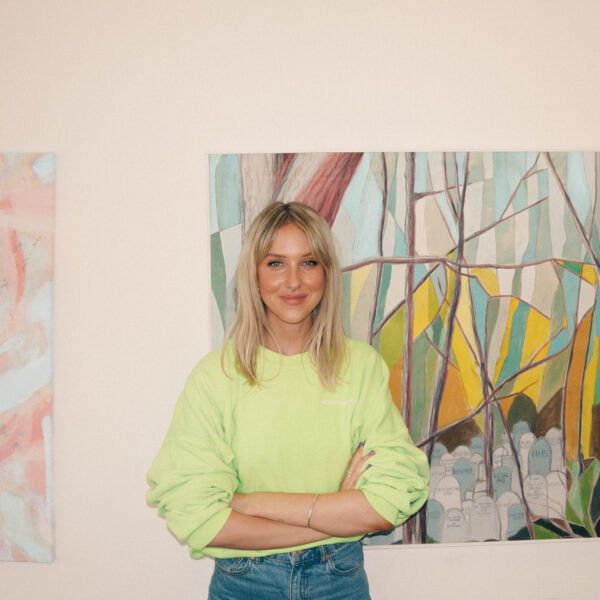
Natasha Collie
Senior Brand Marketing Manager at Penguin Random House UK
At the start of the year, Ladybird Books approached Sonder & Tell with a dream brief. In 2021, a year that’s been particularly challenging for...
In conversation with
Content Editor for Natoora

Food is really about stories. Your favourite childhood memories might involve aromas from the kitchen; perhaps the worst date you ever had led you to your new favourite restaurant; and right now, the meals you cook might be the best marker of your time.
Bre Graham is particularly attuned to the fables that surround food. She’s content editor for Natoora, London’s leading seasonal supplier, which has switched from servicing the hospitality industry to helping feed the public via home delivery. Telling stories of growers, from an Italian couple who home-press olive oil to a Yorkshire family who’ve have grown rhubarb for four generations, Bre says “It makes the taste of everything we source seem so much sweeter.”
As many of us take comfort in the rituals of preparing food, we asked Bre about the writers she’s turning to, what inspired her culinary career and why telling stories about food is more important than ever.
All of our growers are individually so interesting. I want to know about the women who pack the world’s best-tinned tomatoes, the couple in Italy who make the best olive oil and all about Robert from Yorkshire whose family have grown Rhubarb for four generations. When you shine a light on these stories, it makes the taste of everything we source seem so much sweeter because you know where it’s from and who has grown it. I’m very proud to work for a company that is actually shifting how we think about food. We want people to know that everything that we buy, cook and eat has an impact on the wider food system so the stories we tell are centred on what that really means. In all of my journalism, both in food and travel writing these were the stories I most wanted to tell so to be able to get to do that every day feels really special.
I’ve always been homesick in one way or another – I’m from Sydney originally but I grew up in Singapore and moved to London when I was 18. Eating food that reminds me of certain people or places to me is the quickest way to quell feeling like that. When I was growing up in Singapore I missed my grandparents back in Sydney constantly. I craved my grandfather’s roast lamb or Granny’s pumpkin soup so much so that often it felt like all I could think about. When I moved back to Sydney after ten years in Singapore I spent my teenage years in Malay and Singaporean restaurants missing hawker centres, the smell of bee-hoon noodles and eating buttery roti on the way home from school. I’ve been living in London for eight years now and everything that I cook or write about is in a way trying to cure feeling so far away from home. What I love most about food writing is how transportive it is. I feel like if I write about things enough or fill my kitchen with the memory of a dish I can feel it too. I think in a way I started writing about food because it was the quickest way of capturing how food made me feel because I had a fear of forgetting it. My notebooks now contain every meal worth remembering.


At every point in my life when I’ve struggled, cooking has always been my core comfort. My constants are Nigel Slater and Nigella Lawson. They both write so beautifully and their recipes are fuss-free and full of food that I grew up eating from Nigella’s brownies as every birthday cake in my house to Nigel’s sausage and broccoli pasta. Stephanie Alexander, Maggie Beer and Charmaine Soloman are all extraordinary Australian food writers whose words and recipes really are at the core of how we cook as a country, reading them especially when feeling so far away from family has been a great comfort. Elizabeth David is my number one love though, An Omelette and A Glass of Wine is pure escapism, it can make you laugh, linger on the pages and then immediately want to cook everything in it. I also keep turning to kitsch old cookbooks for comfort because they feel so far away from everything else at the moment – Fanny Craddock’s Cook Hostess Book is making me plan dinner parties for when this is all over.
At Natoora the core of what we do and the things in the world we’re trying to change are so strong so every story we tell is to support that. Our mission is to change the current broken food system with a transparent and sustainable supply chain. Through sourcing such radically seasonal produce, we can highlight the true cost of farming and protect the land from soil depletion. This increases biodiversity, keeps traditional growing practises alive and makes nutritionally dense crops – these all factor into why what we source has such incredible flavour. In this current situation where food is seemingly being reexamined in some ways, we want people to know that every individual’s food shop has the power to influence how food is farmed. Since this crisis started we very quickly adapted our chef-only app so that it could be used by customers for home deliveries. This shifted our content focus as we’re now educating the wider consumer too. It’s been really interesting having to adapt our content to fit both chefs and home-cooks.

I’m really ready for the return of blogs. I mourn Rookie and I hope that that type of content finds a new way to exist. I worked on a print magazine called Oh Comely (no longer is around anymore sadly, one of the many women’s media losses of 2019), I always think that our issues even though we were a print magazine felt like an old school blog because of the sense of community we built around it. Now that publications like Oh Comely, The Pool, and The Debrief aren’t here it is amazing to see that writers are building new homes for their work in newsletters, blogs and by building their own platforms so they can write on their own terms. This is already having an impact on how traditional magazines think about content which is great to see.
Oh so many writers – Jean Rhys, Doris Lessing, Joan Didion, Rachel Roddy, Elizabeth David, Mina Holland, Anthony Bourdain, Jane Grigson, Fergus Henderson, Emiko Davies, Laura Goodman, too many to count!
I don’t know what it is exactly but I can’t read or watch anything new at the moment. I think with so much other stuff going on in life right now all I can do is re-read things. So, I’m going back to my favourites like Emma Forrest’s Your Voice in My Head, Jeffery Steingarten’s two brilliant books, and Apricots on the Nile by Colette Rossant.

When I was working at St. John many moons ago sitting above the Smithfield restaurant in the office, one of my jobs was to cut out Fergus’s columns from Gourmet Traveller (the world’s best food magazine which happens to also be Australian). He writes in such a way that it never seems to distract from the recipe but instead just anchors it so perfectly in a moment. I can now not think of anchovies draped over a salad and not remember the story about the salad that saved his life. I think that this type of storytelling is so important when it comes to writing about food. They’re the recipes and cookbooks that I connect with the most. I want to be able to sit in bed and read a cookbook like a novel. Over the last year, I’ve been working on my first book, it’s been so exciting to see friend’s starting to cook from the snippets I’ve sent them so they can start making their own memories with the dishes that I’ve written.
A focus on feeling, flavour and purpose.
Bre's Storylist

Senior Brand Marketing Manager at Penguin Random House UK
At the start of the year, Ladybird Books approached Sonder & Tell with a dream brief. In 2021, a year that’s been particularly challenging for...

Founder Of Simple Politics
Talking about serious issues doesn’t mean defaulting into a serious tone of voice, or using complicated language. If anything, accessibility, clarity and a touch of...

Brand & Community Manager at Homethings
Creating a tone of voice from scratch can be challenging. But a blank slate to work from also mean there’s room for something a bit...

Founder at Bonfire With Soul

Co-Founders Of Duzi Studio